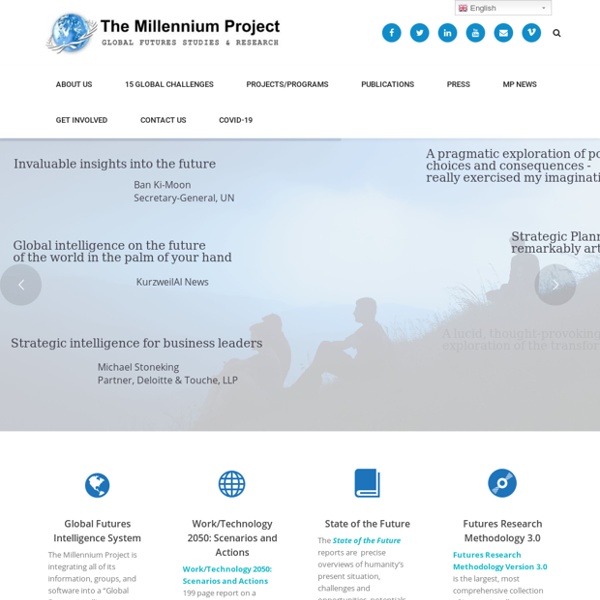Imagining Canada's Future - 2018 Consultation
Emerging future global challenges raise the possibility of opportunities and new directions for societies as well as warnings of potential crises. The following briefly summarizes the 16 future challenges identified through a recent horizon scan, including the key changes contributing to each challenge as well as its potential impacts. The challenges explored here have several shared characteristics. They are emerging problems with the potential to shape society in profound ways. Each challenge is multidisciplinary and requires broad cooperation to solve. Many emerge from technological innovations.
GFIS
Description: The Spain Node was established in 2010, under the auspices of PROSPEKTIKER in San Sebastián. Most recent work is the translation and analysis of initial Millennium Project Work/Tech 2025 study with support from Telefonica. The first Node meeting of the Spanish Node was held on May 11, 2010. Attendees of the May 11, 2010 meeting were: Ibon Zugasti – Prospektiker, Instituto Europeo de Prospectiva y EstrategiaMikel Irasuegi - Prospektiker, Instituto Europeo de Prospectiva y EstrategiaJose Luis Salmeron - Universidad Pablo de OlavideJosé Manuel Echavarren - Centro de Estudios Andaluces Fátima Gómez – Centro de Estudios Andaluces Jose Miguel Echarri - Instituto de Prospectiva EstratégicaAne Bustinduy - LKSAitor Aranguren- Diputación Foral de Gipuzkoa
IIASA in Brief - Information Kit - IIASA in Brief - IIASA
Through its research programs and initiatives, the institute conducts policy-oriented research into issues that are too large or complex to be solved by a single country or academic discipline. This includes pressing concerns that affect the future of all of humanity, such as climate change, energy security, population aging, and sustainable development. The results of IIASA research and the expertise of its researchers are made available to policymakers in countries around the world to help them produce effective, science-based policies that will enable them to face these challenges. On this page, you will find downloadable information about IIASA, its research, publications, and governance structure. IIASA overview
Paris Peace Forum Project Leaders
The Paris Peace Forum is an annual platform for global governance projects. Conceived as a response to rising tensions in today’s world, it is based on the conviction that sustainable peace can only be achieved through transnational cooperation in several sectors. The Forum thus aims to be the place for joint solutions in the fields of peace and security, environment, development, new technologies and inclusive economy. Every year, it will convene up to 20,000 representatives from politics, economics, academia, media and civil society to discuss and advance governance projects in these domains. The Paris Peace Forum’s Selection Committee received close to 900 applications from 116 countries. Among them, 119 projects were selected to be showcased at the first Paris Peace Forum, taking place from 11 to 13 November 2018 at La Grande Halle de La Villette in Paris.
Global Futures Intelligence System
Versión Española Global Futures Intelligence System (GFIS) To subscribe click here Short video overview Short description
Futurist Methodologies and Articles
I believe that futurist thinking and methodologies are enormously important at this juncture in human history. We have compiled a set of resources for futurists, aspiring futurists, and those who want to draw on expertise in the field. We intend to substantially grow this set of resources over time. For information on Ross Dawson’s work as a futurist please see our keynote speaker and strategy advisor sections. Being a futurist A selection of articles on being and becoming a futurist.
Wikistrat
Wikistrat conducted an 11-day multistage crowdsourced simulation to explore the various pathways by which North Korea could collapse, assess which of the pathways are the most plausible/likely, and “game out” the ways in which other actors are likely to respond. Click here or on the cover image to download the full presentation. Wikistrat’s experts reflect on the geopolitical and security implications of the coup attempt in Turkey, including for:GermanyIsraelISIS and SyriaNATORussia Click here or on the cover image to download the full presentation. This month’s strategic insights from crowdsourced simulations address:Brexit: The Day AfterThe Middle East After the Territorial Elimination of ISISTurkey’s Policy Towards ISISA Chinese Spring Click here or on the cover image to download the full presentation.
Saving for a rainy day – and managing other unexpected shocks - Think Forward Initiative
1 Grinstein-Weiss, M., Russell, B. D., Gale, W. G., Key, C. & Ariely, D. (2017) Behavioral Interventions to Increase Tax-Time Saving: Evidence from a National Randomized Trial. The Journal of Consumer Affairs, Spring, 3-26. 2 Ainslie, G. (1992) Picoeconomics.



